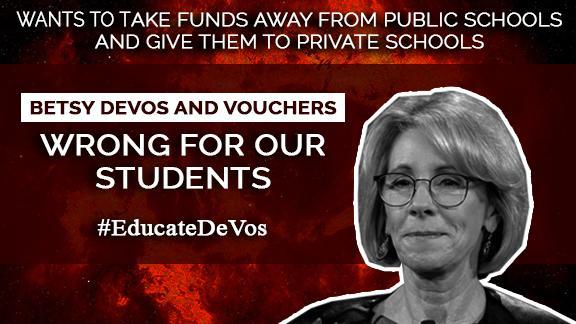The Network for Public Education has shot up a flare that Secretary of Education Betsy DeVos and her allies are making a big push during the COVID-19 crisis to get more funding to private schools. There is a coordinated effort and ultimate goal of school choice advocates to achieve "funding portability," sometimes called “backpack funding.”
"Backpack funding is when taxpayer money follows the student to the public school, private school, home school or charter school," says the group's Executive Director Carol Burris. "Proponents argue that it will not hurt the children or taxpayers of the local public school, because when the student leaves, school costs will be reduced equal to the money in the backpack. That argument is false."
In 2017, Burris provided an analogy in The Washington Post to explain why backpack funding isn't true.
"Consider what happens when a family sends a child off to college. The 'upkeep' (room and board) follows the child. According to the College Board, such costs range from $10,440 at four-year public colleges to $11,890 at private colleges. Family budgets, however, do not go down $11,000 when a son or daughter goes off to school. Mom and Dad still have to pay the mortgage, make the car payments and heat the house. The food bill may go down some, but not by nearly $1,000 a month. And keep in mind that the average length of two college semesters is only 30 weeks a year, making the real cost about $1,500 a month."
According to Burris, the same problem occurs when a student, or group of students, leaves your local public school. Superintendents refer to the difference between the funding that leaves and the resultant savings as “stranded costs.” And those stranded costs add up.
"With the COVID-19 crisis and learning moving online, no doubt privatization advocates see a golden opportunity to push their dream, with the intent that after the crisis passes, the policy will still be in place," she adds.
Much of the research being used by DeVos and her allies comes from the so-called think tank The Center on Reinventing Public Education (CRPE). Burris says that CRPE's research is full of errors and metrics that simply are preferences of what schools should be doing, and not the science of learning and achievement.
In order to make its case, CRPE is promoting the idea that public schools are doing a poor job of providing emergency remote learning, and therefore parents should be able to freely shop among all kinds of schools to get what they think would be the perfect program for their child. Of course, that would immediately drain the funding, potentially causing a collapse of districts that lost large shares of students, even if for a year.
The so-called research they are using to make the case can be found here.
Here are examples of the messages:
- Jeanne Allen argument: Unions are diluting instruction, schools are all over the place. Unions are negotiating to minimize teacher work. Do we wait for them to figure it out or do we let parents shop?
- Betsy DeVos: Using the pandemic to promote privatization and choice.
- Poll commissioned by the American Federation for Children.
- Frederick Hess: This is a great way to save money. Why spend so much now when we are getting so little?

